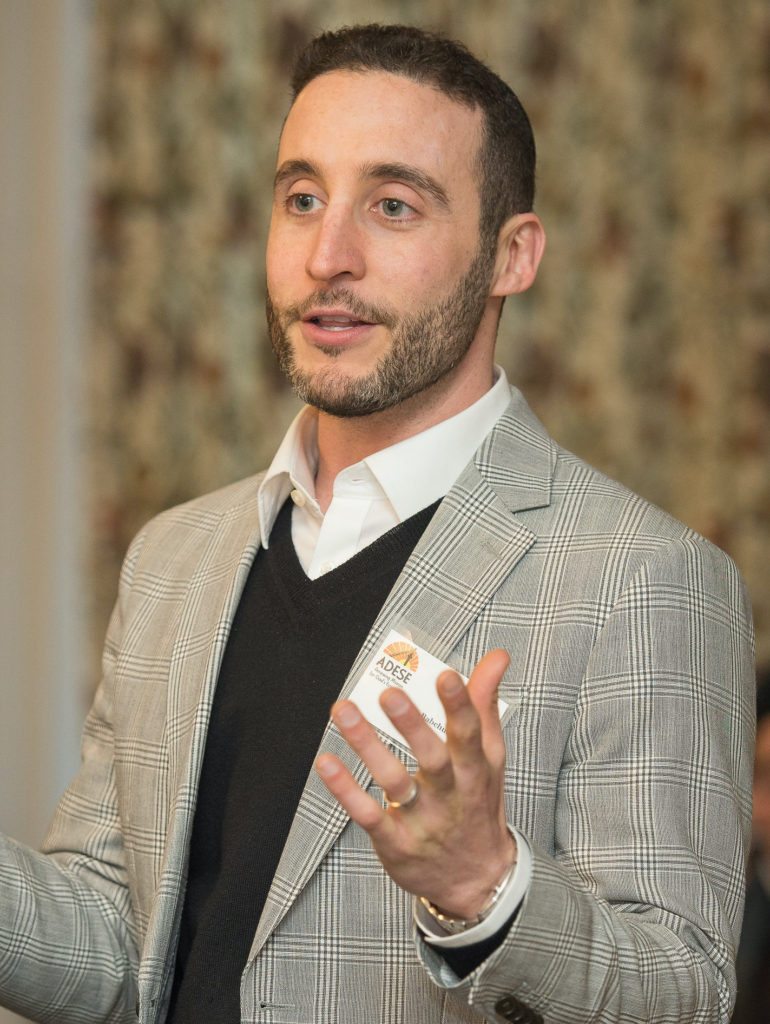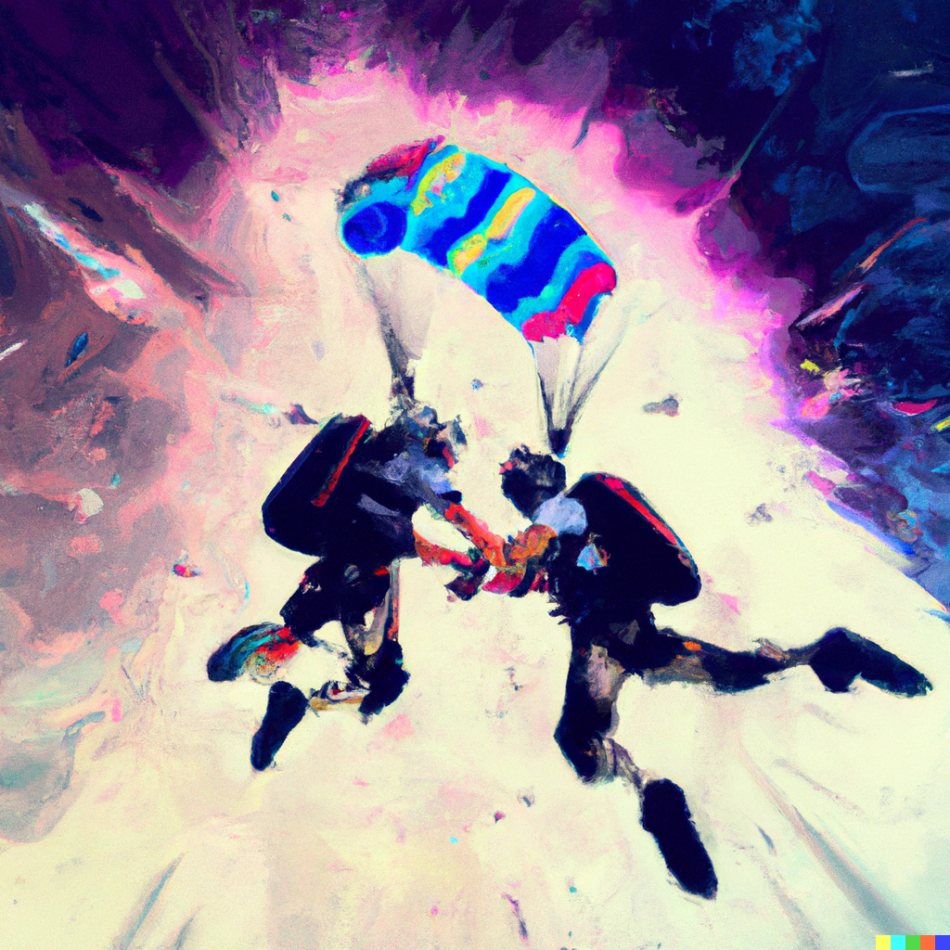Note for readers: This piece is co-authored by Rabbi Elan Babchuck and his son, Micah (bio below), on the occasion of Micah’s graduation from elementary school. They delivered it together as the opening invocation at the school’s annual meeting.
A few weeks after my twentieth birthday, I had what I now jokingly call a quarter-life crisis: I bought a car I had no business driving, changed my college major, and jumped out of an airplane at 13,000 feet, all in one week. And while the car is long gone and I’ve forgotten much of what I learned in Economics, it was skydiving that left me with indelible memories and an important life lesson.
One Sunday morning, a few friends and I drove a couple of hours out to the middle of nowhere, parked in a dirt lot, and made our way into a spacious (if decrepit) barn. We eagerly signed away our rights and our lives to the friendly gentleman at the desk and prepared for the thrill of a lifetime. Unfortunately, the thrill would have to wait, as we were then informed that there was a lengthy training course – videos, demonstrations, and many, many practice sessions – standing between us and the airplane.
We watched and listened intently, and even though we were itching to get going, we dutifully practiced pulling the ripcord dozens and dozens of times. To be clear, I felt like I was ready to go after one or two pulls; it’s not that complicated. You pull the cord, and the parachute comes out. But the instructor insisted that we keep on practicing until we were truly ready until it felt like second nature.
At one point, in his attempt to fend off our impatience, he quoted Mike Tyson – “Everyone has a plan until they get punched in the mouth,” – which kind of made me nervous. When was the mouth-punching supposed to take place? Was that after lunch?
But finally, mercifully, he let us into the airplane, all geared up and certifiably ready to go. We climbed, and climbed, and climbed in the tiny plane until we hit 13,000 feet, at which point all of my insistence about being ready went out the door as soon as our instructor opened it.
But it was time. My instructor – who, by the way, was attached to my back (I was the little spoon) – told me to stand up and go to the door, and I did.
“Are you ready?” He shouted.
“No!”
“Great! Count backward from three!”
I did as I was told. “Three…two…”
And before I could finish, he shoved us off the plane and into oblivion.
I screamed at the top of my lungs the entire way down and for a good part of the drive back to the barn, too. There was an admixture of terror and glee flowing through me; to this day, as I think back to it, I still get butterflies in my stomach. But here’s the remarkable thing: I’m pretty sure that I blacked out for most of the fall because I have no memory of it. But right when we hit the appropriate altitude to open the parachute, I did it without thinking at all. Surviving that moment wasn’t about having a plan; it was about being ready in the deepest, most instinctive way. And I was.
As terrifying as skydiving was, though, it pales in comparison to the experiences of the Israelites as they made their way through the desert. Dangers, real and perceived, manmade and supernatural, lurked at every turn. The only consistent comfort for them was God’s physically-manifested presence that traveled above and in front of them as a pillar of cloud or fire, respectively, and offered them shade, light, and – most importantly – a sense of security.
But for all of the good that God brought them, there was still a very real tension: the Israelites couldn’t camp wherever they wanted to; they only stopped where and when God stopped. And they couldn’t depart at their will; they packed up when God started moving again. There were times that they camped in bucolic places for just one day, and others when they camped in inhospitable ones for several years. They could plan all they wanted, but we know how the saying goes about what happens when humans plan…
This tension was so palpable, so noteworthy, that the Torah text repeats it a total of five times over the span of just a dozen verses, a matter that 15th / 16th-century Italian rabbi Obadiah ben Jacob (Sforno) picks up on in his commentary. Among his multiple comments on this issue, he notes that because of the unpredictable nature of God’s will, any plans they would make at each stop were usually abandoned. So rather than investing their energy into making plans for an uncertain future, they did everything they could at each stop to ready themselves – physically, emotionally, and spiritually – for whatever came next.
What the text seems to be telling us is that our work at each stop in life is not about planning for the next one. Rather, it’s about being fully present in our current stage of life. It’s about staying put – right here, right now – for as long as the spirit needs us to stay put and doing everything we can to be ready when the spirit moves us.
Micah Babchuck (graduating 5th grader): I have to admit, it hasn’t been easy to stay fully present during this past year – my last year of elementary school. I’ve had middle school on my mind since early in the fall and end-of-year projects and celebrations in sight since January. And even though I would love to stay at this school for the rest of my school years, sometimes you just have to go where the world is calling you to go, whether you’ve planned for it or not.
But my time in elementary school hasn’t been about planning. It’s been about being exposed to values, lessons, and people who have helped me become ready for whatever comes next, plan or no plan.
One thing I’ve learned is that communities come in all shapes, sizes, and interests. Just look at recess: we’ve got kids who do art with the art teacher, others who play baseball on their own, and others who started a make-believe club. I mean, there’s even a bunch of kids who created a worm habitat so they could play with worms all day, and they even founded a new country called Wormania!
So at recess, when we’re not even supposed to learn anything, the school snuck in a critically important life lesson: there’s no one way to start a community and no one way to show up in a community, either. And that’s a lesson that I’ll take with me for the rest of my life.
Another important thing that I’ve learned here is that being successful in school isn’t just about what you know, it’s about who you’re becoming. You can learn all of the state capitals by heart, but are you going to be kind to the people you meet as you make your way through the world? And you can memorize all the facts about the environment that you want, but at the end of the day, do you feel a sense of responsibility to take care of our beautiful planet?
In all honesty, I have no idea what middle school is going to be like. I could be the most popular kid at school, or I could just have a couple of friends. I could play kickball all recess, or I could turn into one of the worm kids. But I’m not all that worried about trying to make a plan for it, either. I know that no matter what comes at me in the fall, I can look back on all of the ways that this school has shaped me over the years and know that in my heart of hearts, I’m truly ready for wherever God needs me next.
Micah Babchuck is a soon-to-be middle schooler who loves skateboarding, taking care of his guinea pigs, and making people laugh. You can find him hosting lemonade stands in the summer and hot chocolate stands in the winter, raising money for some of the causes that he cares most about in this world.

Rabbi Elan Babchuck is committed to leaving behind a world that is more compassionate and connected than the one he found. In pursuit of that commitment he serves as the Executive Vice President at Clal, the National Jewish Center for Learning and Leadership, and the Founding Executive Director of Glean Network, which partners with Columbia Business School. He was ordained in 2012, and earned his MBA that year, as well.
A sought-after thought leader, he has delivered keynotes at stages ranging from TEDx to the US Army’s General Officer Convocation, published in The Atlantic, The Guardian, Washington Post, and Religion News Service, has a column for The Wisdom Daily, contributed to Meaning Making – 8 Values That Drive America’s Newest Generations (2020, St. Mary’s Press) and is the co-author of the forthcoming book Picking Up the Pieces: Leadership After Empire (2023, Fortress Press).
He also serves as:
a Founding Partner of Starts With Us, a movement to counteract toxic polarization in America,
a Research Advisory Board Member of Springtide Research Institute, which focuses on spirituality, mental health and Gen Z,
a founding board member of Beloved Network, a network of startup Jewish communities, and
a member of the Board of Advisors of the Changemaker Initiative.
He lives in Providence, Rhode Island with his wife, Lizzie Pollock, and their three children: Micah, Nessa, and Ayla. In his spare time, he finds sanctuary while climbing rock walls around New England and tending to his backyard garden.

